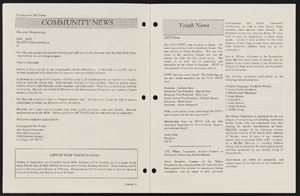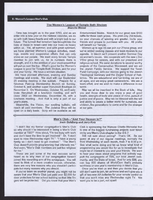Search the Special Collections and Archives Portal
Search Results

Culinary Workers Union Local 226 Las Vegas, Nevada Photographs
Identifier
Abstract
The Culinary Workers Union Local 226 Las Vegas, Nevada Photographs document various activities of the Culinary Union, from the 1950s to 2006, with the bulk of the material documenting the 1990s. Prominently featured in the collection are various strikes, pickets, marches, parades, rallies, and demonstrations from the late 1980s to early 2000s. A large portion of these photographs documents the Frontier Strike of the 1990s. Also included are photographs of press conferences, political rallies, internal committee meetings, Hotel Employees and Restaurant Employees (H.E.R.E.) conventions, and various social events. Materials contain photographic prints, photographic negatives, and a small number of slides.
Archival Collection
UNLV University Libraries Collection on Nevada Mining
Identifier
Abstract
The Nevada Mining Collection is comprised of records that document mining and mines in Nevada from 1842 to 1966. The majority of the collection includes records of various mines and mining companies located in the Esmeralda, Lincoln, Clark, White Pine, and Nye counties, dating from 1900 to 1928. The collection includes financial, administrative, and business related records; photographs of miners, mining camps, and towns; correspondence; maps; newspaper clippings, pamphlets, newsletters, and booklets.
Archival Collection
Stardust Resort and Casino Records
Identifier
Abstract
The Stardust Resort and Casino Records (1950-2006) contain materials of the Stardust Resort and Casino, which operated in Las Vegas, Nevada from 1958 to 2006. The collection contains materials on events hosted by the Stardust, the resort and casino's corporate history, interior and exterior building design, and performers. The collection also includes photographs, negatives, and slides that document the history of the resort and casino. Newspaper and magazine clippings, advertisement and marketing materials related to the Stardust's venues, shows, entertainers, and events are also present in the collection. The collection also contains a significant amount of audiovisual material, including VHS tapes, audio cassettes, optical discs, film reels, and cassette tapes containing footage and audio recordings of Stardust show promotions, news broadcasting clips, interviews, and commercials featuring the Stardust.
Archival Collection

Transcript of interview with Robert "Bob"Agonia by Marcela Rodriguez-Campo, September 6, 2018
Date
Archival Collection
Description
Robert “Bob” Agonia (1938- ) was born in Garden Grove, California on a migrant camp made up of Filipino and Mexican-American workers. Agonia’s father was a farmer on a 70 acre farm owned by the Beggs family. Agonia did not spend much time living on the migrant camp, as his father moved the family to a private residence when Agonia was four. Agonia attended school, during an era of school desegregation in Garden Grove. He recalls that his mother dealt with segregation during her schooling, being forced to attend a school miles down the road from her home despite living across the street from another school. Agonia recalls his community being very diverse with families sharing Filipino and Mexican-American heritage and his neighbors being Japanese Americans. Agonia participated in a multicultural Boy Scout troop. After high school, Agonia joined the Peace Corps and served in El Salvador. While there, Agonia worked in an agricultural research center in Santa Tecla where he helped local farmers select the proper insecticide for their crops. After the Peace Corps, Agonia had his choice of government jobs, ultimately selecting to work for the Internal Revenue Service. Agonia’s work with the IRS is what eventually brought him from California to Las Vegas. He quickly realized that the type of IRS cases he would be handling in Las Vegas were completely different from the work he was accustomed to in California. One of those unique cases required him to close the doors of a downtown casino. Since moving to Las Vegas, Agonia was critical in establishing a Las Vegas LULAC chapter, an American GI Forum, an EEO council, and the UNLV Engineering school.
Text

Transcript of interview with Frankie Perez by Elsa Lopez and Laurents Bañuelos-Benitez, November 5, 2018
Date
Archival Collection
Description
Frankie Perez (1986- ) is an individual that constantly found himself navigating two worlds, whether it was military versus civilian; female versus male; or being Latinx in the United States. As a result of this navigation, Perez has a unique perspective on our ever more complicated world that not many individuals possess. Perez served in the military during the Do Not Ask, Do Not Tell policy which made it difficult for someone dealing with gender identity, to seek out the proper support they need. Despite the policy, and other policies that were put in place afterwards to inhibit the transgender community in the military, Perez began his transition while still serving his country. In direct contradiction of popular opinion, Perez discovered that the military easily accommodated his transition. Outside of the military Perez is an active voice in the LGBTQ community. As a member of the LGBTQ, Latinx, and military community, Perez has a unique perspective that he uses to fight for both LGBTQ and Latinx rights. Currently, Perez is finishing his degree in gender and sexuality studies at UNLV. He hopes to use his education to help people have the difficult discussions and improve conditions for his communities.
Text

Interview with Oscar Foger, May 5, 2005
Date
Archival Collection
Description
Text



